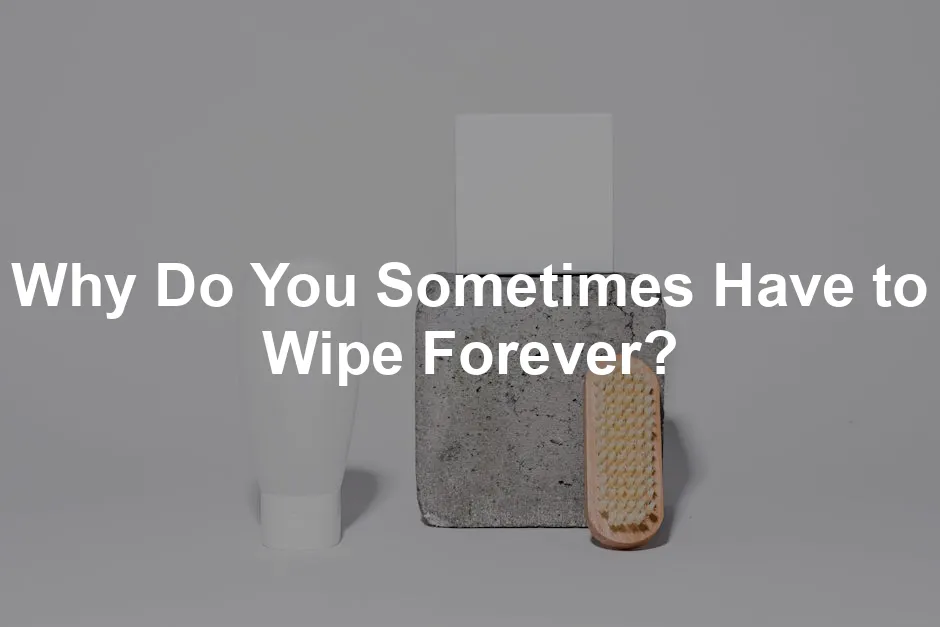
Why Do You Sometimes Have to Wipe Forever?
Introduction
Have you ever felt like you’re wiping forever after a bowel movement? You’re not alone. Many people experience this uncomfortable and frustrating issue. In this article, we’ll uncover the reasons behind excessive wiping and offer practical solutions to help you feel clean and comfortable.
Summary and Overview
Endless wiping refers to the frustrating experience of needing to wipe multiple times after using the bathroom. This issue can lead to irritation, discomfort, and even skin problems. Various health implications may arise, including increased risk of infections and skin irritation.
Several factors contribute to this predicament. Dietary habits, such as low fiber intake, can result in softer, stickier stools. Additionally, underlying health conditions like hemorrhoids or irritable bowel syndrome (IBS) might exacerbate the situation. In this article, we will discuss these factors in detail, explore effective solutions, and highlight when it’s essential to seek medical advice. Understanding why you may need to wipe excessively can help you take steps toward improvement and regain comfort in your daily life.

If you’re looking to bulk up your fiber intake, consider incorporating Fiber Supplement Pills into your routine. They’re an effortless way to achieve your daily fiber goals and promote better digestion!
Causes of Endless Wiping
Incomplete Bowel Movements
Have you ever felt like you just couldn’t get it all out? Incomplete bowel movements are a common reason for excessive wiping. When you don’t fully empty your bowels, you may find yourself reaching for the toilet paper repeatedly.
One significant factor here is relaxation. When you’re tense, your body can’t perform its best. It’s essential to take a moment to breathe and allow your muscles to relax. This can lead to a more complete evacuation.
So, how can you achieve that? Here are some tips:
- Take Your Time: Don’t rush your bathroom breaks. Give yourself at least 5-15 minutes to relax and fully empty your bowels.
- Proper Positioning: Use a Footstool for Toilet to elevate your feet. This can help align your rectum for easier stool passage.
- Listen to Your Body: Pay attention to signals that indicate it’s time to go. Ignoring these can lead to incomplete bowel movements.
Interestingly, studies show that about 25% of people experience incomplete bowel movements regularly. If you find yourself in this category, making small changes can make a big difference.

Stool Consistency
Now, let’s talk about stool consistency. The texture of your stool can significantly impact how much you need to wipe. Soft, sticky stools are often more challenging to clean, leading to endless wiping.
Diet plays a crucial role in stool consistency. If you’re eating a low-fiber diet, your stools may end up being loose or sticky. Conditions like irritable bowel syndrome (IBS) and inflammatory bowel disease (IBD) can also contribute to this issue.
Here are some dietary tips to consider:
- Increase Fiber Intake: Aim for at least 25-30 grams of fiber daily. Foods like fruits, vegetables, and whole grains can help.
- Stay Hydrated: Drink plenty of water to help soften your stools. Dehydration can lead to harder, more difficult stools.
- Limit Processed Foods: These can contribute to unhealthy stool consistency. Opt for whole, natural foods whenever possible.
If you notice that your stools are often sticky or loose, it might be time to consult a healthcare professional. Understanding your stool consistency can lead to better wiping habits and overall digestive health. Remember, you deserve to feel clean and comfortable after every visit to the restroom.

For added digestive support, consider sipping on Herbal Tea for Digestion. It can provide a soothing effect and help keep your digestive system on track!
Hemorrhoids and Anal Conditions
Hemorrhoids can make wiping a real challenge. These swollen veins in the rectum can cause discomfort and bleeding. Symptoms include itching, pain, and difficulty cleaning the area. Studies reveal that about 1 in 20 adults in the U.S. experience hemorrhoids at some point.
When hemorrhoids flare up, wiping can become a struggle. The irritation may lead to excessive wiping, causing further discomfort. Anal fissures, or small tears in the anal lining, can also complicate the wiping process. These conditions often create a cycle of irritation, leading to more wiping and discomfort.
Understanding the prevalence of these conditions can help. Many people face this issue, and it’s essential to address it. Consulting a healthcare professional can provide relief and effective treatment options.

For those times when discomfort strikes, having a reliable Hemorrhoid Cream on hand can make all the difference. It provides soothing relief when you need it most!
Fecal Incontinence
Fecal incontinence is another reason for endless wiping. This condition refers to the inability to control bowel movements, leading to unexpected leakage. It affects about 1 in 10 people, making it a more common issue than many realize.
Causes of fecal incontinence can vary. Weak pelvic floor muscles, nerve damage, or chronic constipation often play a role. When control is compromised, it can lead to frequent wiping and embarrassment.
Management strategies include pelvic floor exercises and dietary adjustments. Strengthening these muscles can improve control, reducing the need for excessive wiping. Incontinence management techniques, such as using protective undergarments, can also help maintain confidence and comfort.

Pelvic Floor Dysfunction
Pelvic floor dysfunction can significantly impact wiping habits. The pelvic floor muscles are vital for bowel control. When these muscles are weak or tight, they can hinder complete bowel evacuation.
Pelvic floor issues may arise from various factors, including pregnancy, surgery, or chronic straining. These conditions can lead to incomplete bowel movements, resulting in the need for more wiping.
Exercises, such as Kegel Exercise Balls, can strengthen these crucial muscles. Therapy focusing on relaxation techniques can also help alleviate tightness. Research indicates that nearly 25% of people experience pelvic floor dysfunction, highlighting its prevalence.
Improving pelvic floor health can lead to better bowel function and less wiping. Seeking guidance from a physical therapist specializing in pelvic health can provide personalized strategies for improvement.

Best Practices for Effective Wiping
Experiencing endless wiping after a bowel movement can be frustrating. However, there are effective strategies you can adopt to minimize this issue. Let’s explore dietary adjustments, wiping techniques, and alternative cleaning methods that can help you achieve a cleaner and more comfortable experience.
Dietary Adjustments
Your diet significantly impacts stool consistency. By focusing on fiber and hydration, you can improve your bowel health.
Increase Fiber Intake: Fiber-rich foods are essential for smoother bowel movements. Incorporate fruits, vegetables, whole grains, and legumes into your meals. Foods like apples, berries, broccoli, and beans are excellent choices. Aim for 25-30 grams of fiber daily. This can help bulk up your stool, making it easier to pass and reducing the need for excessive wiping.
Stay Hydrated: Hydration plays a crucial role in digestion. Drinking enough water helps soften your stool, making it easier to eliminate. Aim for at least eight glasses of water a day. Dehydration can lead to harder stools, increasing the chance of messy clean-ups. Remember, hydration works hand in hand with fiber for optimal results.

And while you’re at it, why not sip from a Water Bottle with Time Marker? It’s a fun way to keep track of your hydration goals!
Wiping Techniques
Wiping techniques matter just as much as what you eat. Here are some recommended methods to enhance your cleaning process and minimize irritation.
Wipe Front to Back: Always wipe from front to back. This technique helps prevent the introduction of bacteria into the urethra, especially for women. It promotes better hygiene and reduces the risk of urinary tract infections.
Choose the Right Materials: Consider using Flushable Wet Wipes instead of dry toilet paper. Wet wipes can provide a gentler clean, reducing irritation. Opt for unscented wipes designed for sensitive skin to avoid potential allergic reactions. Remember, dispose of them properly as many are not flushable.
Limit Excessive Wiping: Instead of aggressive wiping, aim for a few gentle swipes. If you find yourself needing more, it may indicate a need for dietary changes or a visit to a healthcare professional.

Alternative Cleaning Methods
If you’re still struggling with cleanliness, it might be time to explore alternative cleaning methods.
Consider Using a Bidet: Bidets are becoming increasingly popular. They spray water to cleanse the area effectively, reducing the need for wiping. Bidets not only enhance cleanliness but also provide comfort. They can be especially beneficial for individuals with sensitive skin or conditions like hemorrhoids. You can find a great Bidet Toilet Seat Attachment for a luxurious experience!
Flushable Wipes as an Option: If a bidet isn’t available, consider using flushable wipes for a more thorough clean. Ensure they are labeled as flushable to prevent plumbing issues. These wipes can help you feel fresher and cleaner after using the bathroom.
In conclusion, by making thoughtful dietary changes, employing effective wiping techniques, and considering alternative cleaning methods, you can reduce the discomfort of endless wiping. These practices can lead to a more pleasant bathroom experience. Remember, if issues persist, consulting a healthcare professional can provide further guidance and support.

When to Seek Medical Advice
Sometimes, endless wiping indicates a deeper issue. It’s essential to recognize warning signs that suggest it’s time to consult a healthcare professional.
First, look out for blood in your stool. This can indicate hemorrhoids or more serious conditions. If you notice any unusual bleeding, don’t hesitate to reach out to a doctor. Severe pain during bowel movements is another critical sign. If you feel intense discomfort, it’s best to get evaluated.
Additionally, persistent irritation or itching around the anal area can signal underlying conditions. Conditions like anal fissures or infections may require treatment. So, pay attention to your body’s signals.
Ignoring these signs may lead to complications. It’s crucial to address any potential health issues early. If excessive wiping continues, consult a healthcare provider to explore possible underlying health conditions.

Conclusion
In summary, excessive wiping after bowel movements can stem from various causes. Factors like stool consistency, hemorrhoids, or incomplete evacuations play a significant role. If you find yourself wiping excessively, consider your habits and explore solutions. Don’t overlook warning signs like blood, severe pain, or ongoing irritation. Consulting a healthcare professional can provide guidance and help you address any potential health concerns. Remember, your comfort and health are paramount!
FAQs
How does diet affect the need for endless wiping after a bowel movement?
Your diet significantly impacts your bowel health. A low-fiber diet can lead to loose stools, making wiping more challenging. Fiber helps bulk up stools, making them easier to pass. Foods rich in fiber include fruits, vegetables, and whole grains. Staying hydrated is also crucial. Drinking enough water helps soften stools and promotes regular bowel movements. Aim for at least eight glasses of water daily to support digestion.
What are some alternative methods to using dry toilet paper for a more effective clean?
If you’re struggling with cleanliness, consider using wet wipes or a bidet. Wet wipes provide a more thorough clean and can reduce irritation. Just ensure they are labeled as flushable to avoid plumbing issues. Bidets spray water for a gentle cleanse, often leaving you feeling fresher without the need for excessive wiping. Both options can enhance your bathroom experience.
How common are hemorrhoids, and how do they contribute to the need for excessive wiping?
Hemorrhoids are quite common, affecting about 1 in 20 adults. These swollen veins can cause itching, pain, and bleeding, complicating wiping. When hemorrhoids flare up, the irritation may lead to increased wiping as individuals try to clean the area. It’s essential to address hemorrhoids early to prevent further complications. Treatments range from over-the-counter creams to medical procedures for severe cases.
What are some common symptoms of fecal incontinence, and how can it be managed?
Fecal incontinence involves the inability to control bowel movements, leading to leakage. Common symptoms include unexpected bowel leakage and a frequent urge to go. Management strategies include pelvic floor exercises, dietary adjustments, and behavioral techniques. Consulting a healthcare provider can help develop a personalized plan to manage symptoms effectively.
What are some recommended pelvic floor exercises to help prevent passive soiling?
Pelvic floor exercises, like Kegels, strengthen the muscles controlling bowel movements. To perform Kegels, tighten the muscles you would use to stop urination, hold for five seconds, and release. Repeat this 10-15 times, several times a day. Other exercises may include squats and bridges, which also engage the pelvic floor. Regular practice can improve muscle control and reduce the risk of fecal incontinence.

For a refreshing cleanse, consider using Anal Fissure Relief Cream. It’s a great way to soothe irritation and keep things comfortable!
Please let us know what you think about our content by leaving a comment down below!
Thank you for reading till here 🙂
All images from Pexels




